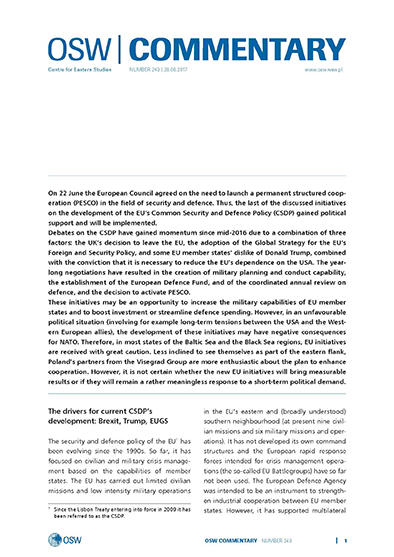Germany's security policy and the Trump administration: modified rhetoric and moderate commitments
Germany's security policy and the Trump administration: modified rhetoric and moderate commitments
Author(s): Justyna Gotkowska
Subject(s): International relations/trade, Security and defense, Military policy, Geopolitics
Published by: OSW Ośrodek Studiów Wschodnich im. Marka Karpia
Keywords: Germany's security policy; Trump administration; Germany; USA
Summary/Abstract: The new administration of President Donald Trump is pushing for its European allies to increase their defence budgets and their military commitment to international security to a much greater extent than previous US administrations. At the 53rd Munich Security Conference and the meeting of NATO defence ministers in February, the US Secretary of Defence Gen. James Mattis and the Vice-President of the United States Mike Pence spoke in this vein. This message is directed at Germany in particular, which has so far been unwilling to substantially increase its defence budget (in 2016 it stood at 1.19% of GDP, i.e. €34.2 billion), or to send the Bundeswehr to operations abroad.Berlin’s response to the US pressure will take into account both political realities (elections to the Bundestag in autumn 2017) and the broader German approach to security policy. Germany will gradually increase its defence expenditure in the future, albeit without reaching the level of 2% of GDP. At the same time, the German government will seek to redefine how European defence spending is calculated. It wants to include in it not only expenditure for military purposes, but also for development and humanitarian aid. In an election year it is hard to expect any significant expansion of the Bundeswehr’s involvement abroad. Instead, Germany will present its efforts to develop the Common Security and Defence Policy (CSDP) within the EU and make the Bundeswehr a hub of military cooperation in the region as its greatest contributions to strengthening European defence. Germany may work towards even greater military integration within the EU, which – if the Social Democrats win the parliamentary elections – could mean favouring European security policy at the expense of trans-Atlantic relations and NATO.
Series: OSW Commentary
- Page Count: 7
- Publication Year: 2017
- Language: English
- Content File-PDF

